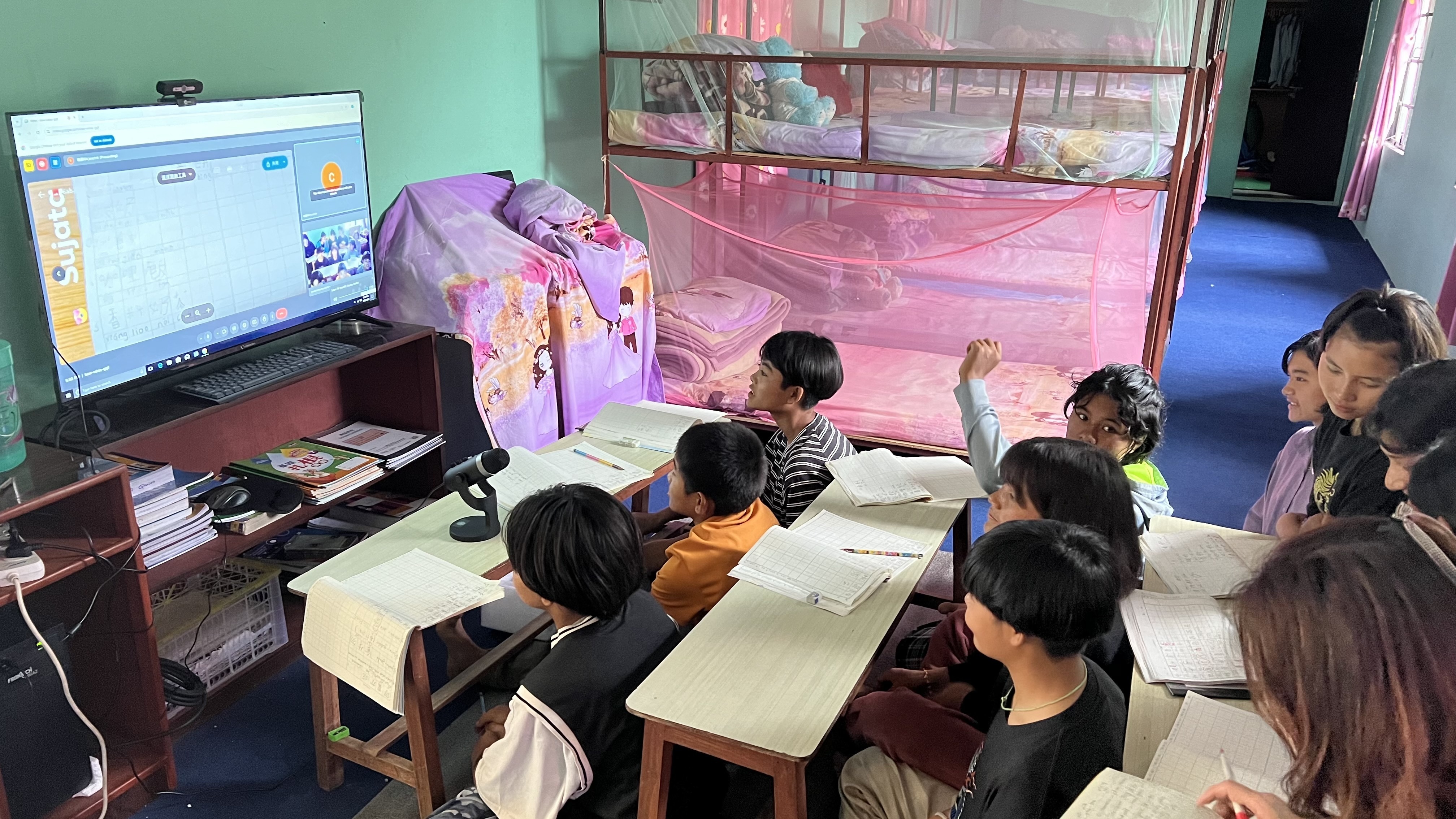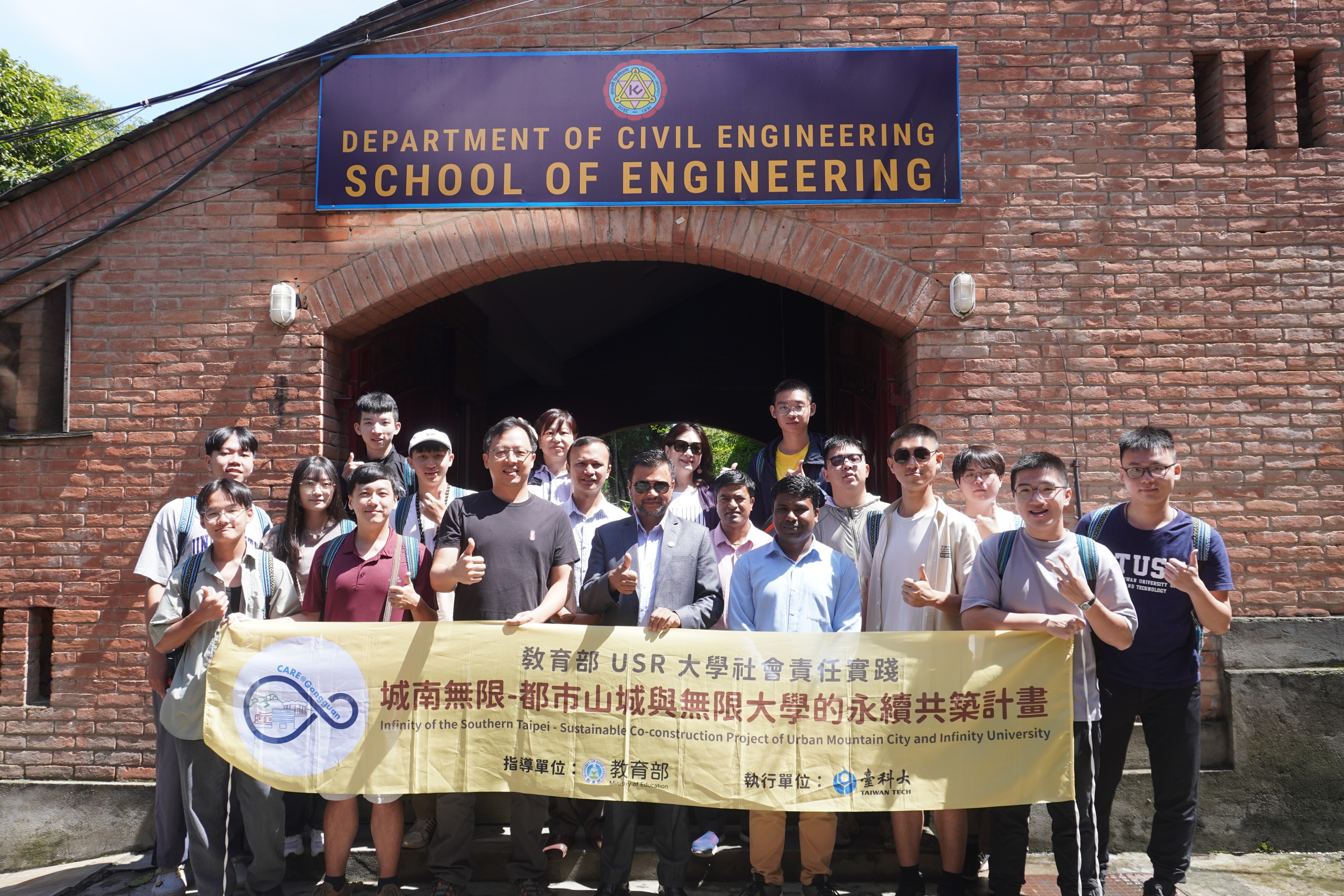Taiwan Tech Students build a pathway for Nepalese kindergartens, gaining global experience.
Since 2020, Taiwan Tech has been actively involved in earthquake recovery efforts in remote areas of Nepal. In July of this year, the “Infinity of the Southern Taipei - Sustainable Co-construction Project of Urban Moutain City and the Infinity University” project team returned to Nepal with a focus on “land sustainable engineering”. The initiative aims to enhance students' professional abilities in civil engineering, strengthen site-appropriate engineering design improve local kindergartens by building handmade pathways, and offer Chinese language classes and cultural exchange activities, thereby broadening students' international experience and vision in international society and providing new opportunities for children in rural regions.

Taiwan Tech students share the steps of constructing the handmade pathway with the children in the kindergarten.

The Taiwan Tech team leads children in kindergartens to conduct Chinese courses.
The Taiwan Tech team, in collaboration with the Juju Mama Children's Education and Care Association, led by Associate Professor Po-Chien Hsiao from the Department of Civil and Construction Engineering, led 13 students to Nepal for hands-on work to revitalize the local community and raise disaster prevention awareness. They planned to reconstruct collapsed slate houses into story houses in Pisang, Manang, with site measurements completed in 2023. Back in Taiwan, the team spent a year conducting careful engineering planning and spatial design.
However, due to heavy rains this year that damaged the road to Pisang, the team had to adjust their plans for safety reasons. They went to Pharping, a suburb southwest of Kathmandu, where they built a natural and safe handmade pathway for the Bodhichitta Development, a local nursery, demonstrating Taiwan Tech's active role in the international community.
The team worked together to level slopes, handle gravel, and lay slate stones, using Paiwan's traditional methods to build stone steps connecting the campus to the driveway. This experience not only provided practical skills but also fostered coordination and communication abilities among the students.
To prepare for the Nepal trip, Taipei Tech students visited the Jiaping tribe in Pingtung in June this year to learn pathway construction techniques and experience hand-made trails from the Taiwan Thousand Miles Trail Association. Student Tsung-Han Tsai noted that while Nepal’s geology differs greatly from Jiaping’s, the team faced numerous challenges despite their preparation. Decisions between aesthetics and durability required on-the-spot discussions. Tsai believes this experience significantly enhanced the team's adaptability and interpersonal communication skills, which will be valuable for future challenges.

The Taiwan Tech team laid a handmade pathway at the entrance of the kindergarten, ensuring safe access between the hospital area and the driveway for both children and staff and reducing the risk of slipping on muddy slopes.

Taiwan Tech students provide one-on-one Chinese writing lessons for the children.
In addition to field service, the Taiwan Tech team visited Kathmandu University and Tribhuvan University in Nepal for academic exchanges. The Department of Civil Engineering of Kathmandu University is renowned for the field of hydraulics. The team explored tunnel models, physical dam models, bridge models, cement maintenance, and concrete testing equipment, gaining practical insights into hydraulic and hydropower engineering. Tribhuvan University, known for its rich history, culture, and comprehensive experimental facilities, offered enlightening tours of its structural and hydraulic laboratories. To foster research collaboration, student exchanges, and USR initiatives between the two parties, Taiwan Tech is planning to sign MOUs with both universities, laying the groundwork for future international cooperation.

A group photo of the Taiwan Tech team visiting Kathmandu University.

Taiwan Tech students visited the dam model at Kathmandu University.
Man Bahadur Adhikari, the director of the Nepal kindergarten, expressed his deep gratitude to the Taiwan Tech team for their assistance and praised the students for their professional skills and friendly attitude. He noted that the students applied their classroom knowledge to practical actions, providing substantial benefits to the local community and highlighting Taiwan Tech's commitment to cultivating "π-type" talents—balancing professional expertise (left foot), liberal arts skills (right foot), and international connectivity (horizontal bar). This approach aims to develop students to become scientific and technological talents with innovative practices and social care.
Taiwan Tech will continue to encourage faculty and students to engage in international collaboration. Professor Po-Chien Hsiao remarked, “I am pleased to see Taiwan Tech students fully embrace the hands-on experience abroad and demonstrate effective site engineering design and practice”. He also hopes to return to Pisang next year to complete the storyhouse project and expand their service to other areas of Nepal, fostering cross-cultural exchange and enhancing students' sense of social responsibility.

A group photo of The Taiwan Tech team visiting Tribhuvan University.

Taipei Tech students visited Tribhuvan University, where they learned about the Centrifugal Pump Test Rig.
